Home » health and beauty » BEST 5 AUTOMATIC BLOOD PRESSURE MONITOR
Blood pressure monitoring is one of the most fundamental and widely practiced diagnostic procedures in modern healthcare. Over the past decade, blood pressure monitors have evolved from manual sphygmomanometers, which required skilled operators, to advanced digital and automated devices that provide accurate, reliable, and user-friendly measurements. Having worked with medical technologies and patient monitoring systems for more than a decade, I have observed how critical continuous improvements in blood pressure monitors have been in enabling early detection of hypertension, guiding treatment decisions, and supporting preventive care.
A blood pressure monitor, in essence, is a medical device designed to measure the force exerted by circulating blood on the arterial walls. It typically records two values: systolic pressure, the peak force during heart contractions, and diastolic pressure, the resting force between beats. Today’s monitors integrate features such as oscillometric measurement, digital displays, memory storage, irregular heartbeat detection, and even Bluetooth connectivity for remote monitoring. These advancements make them not only indispensable in hospitals and clinics but also increasingly accessible for home-based self-monitoring, empowering patients to take a more active role in managing their cardiovascular health.
In my professional experience, the effectiveness of a blood pressure monitor is determined by a combination of accuracy, ease of use, durability, and compliance with international standards. As cardiovascular diseases remain one of the leading global health concerns, the role of reliable blood pressure monitoring devices cannot be overstated.
Here is a guide to some of the best Automatic Blood Pressure Monitors on the market.
- Best Blood Pressure Monitors
- 1. Omron HEM 7124 Fully Automatic Digital Blood Pressure Monitor
- Specifications:
- Pros
- Cons
- 2. Omron HEM 7120 Automatic Digital Blood Pressure Monitor
- Specifications :
- Pros
- Cons
- 3. Omron HEM 7156 T Digital Blood Pressure Monitor
- Specifications :
- Pros
- Cons
- 4. Dr. Morepen Blood Pressure Monitor Model BP-02
- Specifications
- 5.A&D Medical Blood Pressure Monitors
- Specifications :
- Pros
- Cons
- FaQs
Best Blood Pressure Monitors
| SL.No | Product Name | Product Price | Link |
| 1 | Omron HEM 7124 Fully Automatic Digital Blood Pressure Monitor | ₹1,602 | https://amzn.in/d/estAQy4 |
| 2 | Omron HEM 7120 Fully Automatic Digital Blood Pressure Monitor | ₹1,902 | https://amzn.in/d/fh4ATcV |
| 3 | Omron HEM 7156 T Digital Blood Pressure Monitor | ₹2,717 | https://amzn.in/d/2Nel2AG |
| 4 | Dr. Morepen Blood Pressure Monitor Model BP-02 | ₹999 | https://amzn.in/d/hpI9ES7 |
| 5 | A&D Medical Blood Pressure Monitors, British and Irish Hypertension Society (BIHS), and European Society for Hypertension (ESH) | ₹1,549 | https://amzn.in/d/g4sVGK0 |
1. Omron HEM 7124 Fully Automatic Digital Blood Pressure Monitor
The Omron HEM-7124 is a fully automatic upper-arm blood pressure and pulse monitor designed for home use. It uses the oscillometric method (measuring fluctuations in pressure) and includes features aimed at making measurements accurate, comfortable, and easy for users.
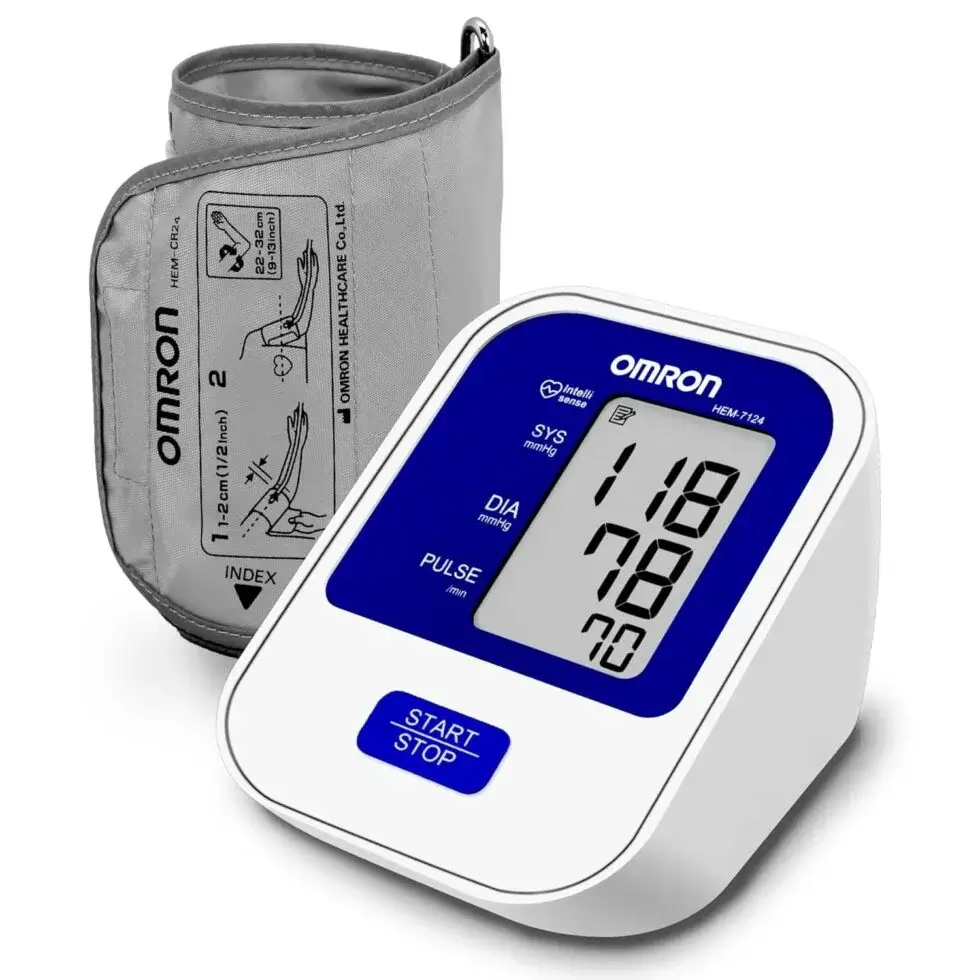
Specifications:
Here are its technical details, as per available sources:
| Feature | Details |
|---|---|
| Model | Omron HEM-7124(also referred to as HEM-7124-IN in India ) |
| Measurement Type | Fully automatic upper-arm blood pressure monitor using the oscillometric method |
| Cuff Size | Fits upper arm circumference of approximately 22-32 cm |
| Pressure Measurement Range | 0 to 299 mmHg |
| Pulse (Heart Rate) Range | ~40 to 180 beats/min |
| Accuracy | Pressure ±3 mmHg; Pulse ±5% of display reading |
| Memory | Stores the last measurement only (one reading) |
| Indicators / Features | • Hypertension indicator (alerts if readings cross certain thresholds)• Irregular heartbeat detection• Body movement detection/cuff wrap “OK” indicator |
| Power | 4 × AA batteries (included) |
| Size & Weight | About 12.8 × 20.3 × 12.2 cm; weight ~ 570 g |
| Warranty | 3 years from the date of purchase in India |
Pros
- Comfortable & less bulky inflation: With IntelliSense technology, the cuff inflates only as much as needed rather than always to a high fixed level. That typically means less discomfort during inflation.
- Good measurement range: 0-299 mmHg covers almost all clinically relevant ranges for home use.
- Easy to use: One-touch operation, large LCD screen, and built-in indicators make it user-friendly for non-technical users.
- Portable battery-powered: No need to stay near mains; can be used in different rooms or taken along.
- Memory for last reading: Useful for comparing recent reading vs older ones quickly.
- Hypertension alert: Helps users know if their reading is high, which is useful for non-experts, so they’re alerted to consult a doctor.
- Reliable brand and support: Omron has a strong reputation; a 3-year warranty in India adds confidence.
Cons
- Limited memory: It appears to store only the last reading; no history tracking across many readings or multiple users. This can make monitoring trends harder.
- No connectivity / Bluetooth: From the specifications, there is no wireless syncing or app connectivity. For users who want to track long-term trends via the app or share with their doctor, this is a limitation.
- Arm cuff worries: Proper cuff size and wrapping are critical for accuracy; if the cuff does not fit correctly, readings may be off. Also, some users may find arm cuffs less convenient than wrist ones.
- Battery dependency: Needs 4 AA (or similar) batteries. Over time, battery replacement adds cost; using it frequently might require keeping spare batteries.
- Bulky / size & portability: At ~570 g and dimensions ~20×13×12 cm, it’s not ultra-compact. It might be less portable compared to very slim monitors or wrist models.
- No advanced features: Doesn’t seem to have averaging of multiple readings, dual user profiles, data export, or alarms/reminders. Those are present in higher-end models.
- Reading variation: As with all blood pressure monitors, some variation is expected. Accuracy depends on user posture, cuff wrapping, rest before measuring, etc. This isn’t a con of the device per se, but users may get different readings if conditions vary.
2. Omron HEM 7120 Automatic Digital Blood Pressure Monitor
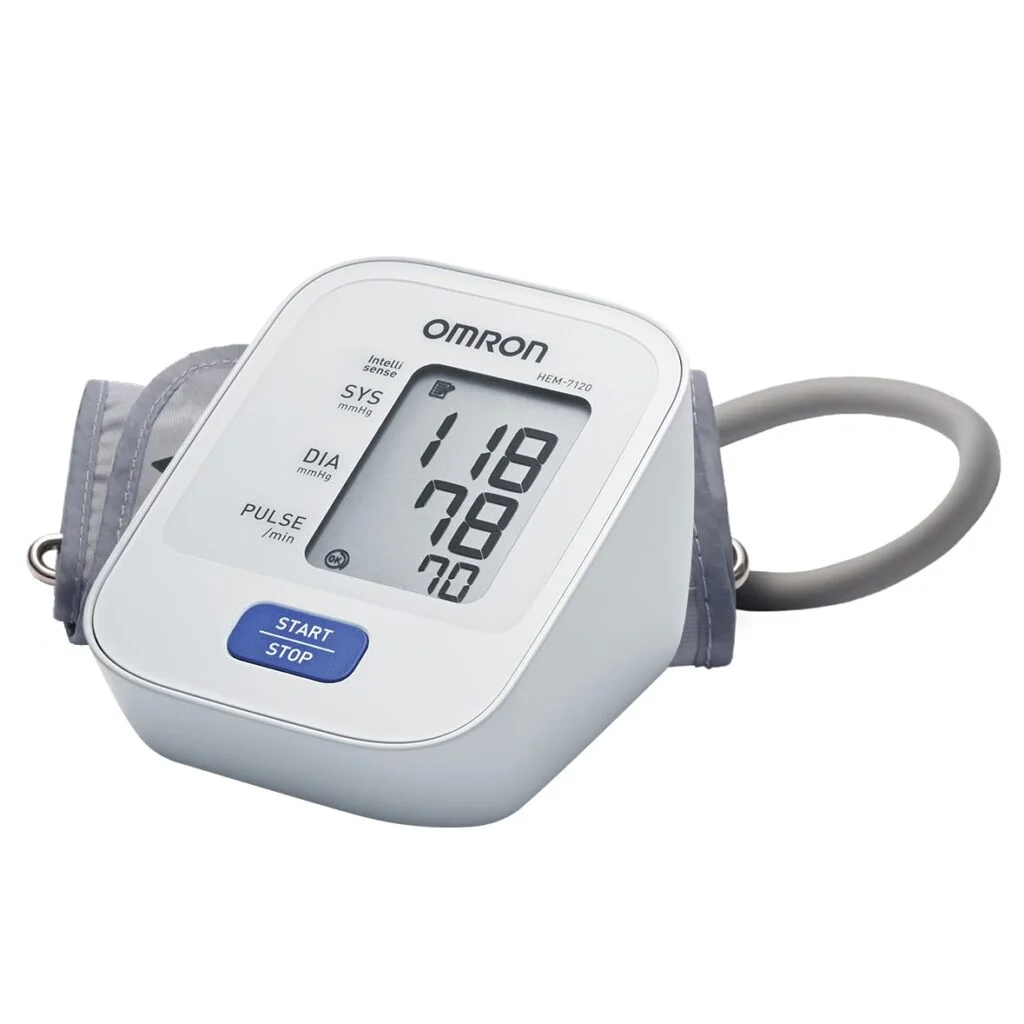
This is a home-use automatic blood pressure (BP) monitor by Omron, model HEM-7120, which uses IntelliSense technology. It’s designed for measuring upper-arm blood pressure and pulse rate
Specifications :
Here are its technical details, as per available sources:
Pros
Here are the things this model does well:
- Comfortable Inflation with IntelliSense
Inflates automatically to an optimal level, avoiding over-inflation. It should give a more comfortable experience. - Good Cuff Size Range
The 22-32 cm cuff size covers many adult arms. For most people, this is adequate. - Useful Additional Indicators
- Reputable Brand & Validation
Omron is a well-known brand; it likely has good reliability and support. The model seems clinically validated. - Simple to use
One-touch operation, automatic inflation/deflation, etc. Good user experience for non-medical users.
Cons
And now, what to watch out for or possible downsides:
- Cuff size limit
If the arm circumference is larger than ~32 cm, this cuff may not fit properly, which will affect readings. For larger arms, a larger cuff or a different model is needed. - Memory capacity is limited
It stores only the last reading(s). If you want to track many past readings (over weeks/months), with charts or multiple‐user memory, this model may fall short. - Battery powered
Requires 4 AA batteries. Battery replacement adds effort and cost; no mention of a built-in rechargeable battery or an AC adapter. - No connectivity
No Bluetooth / WiFi for data syncing, no app integration mentioned. If you want to transfer readings to a phone/computer or share trends easily, you’ll have to do it manually. - Size and portability
At ~560 g and the given dimensions, it is not ultra-compact. If you travel a lot, a smaller or wrist model might be more convenient. - Accuracy limitations inherent to home monitors
As with any non-clinical/home device, readings can be affected by cuff placement, arm movement, posture, etc. Also, detection of irregular heartbeat is limited (can signal but not diagnose arrhythmias)
3. Omron HEM 7156 T Digital Blood Pressure Monitor
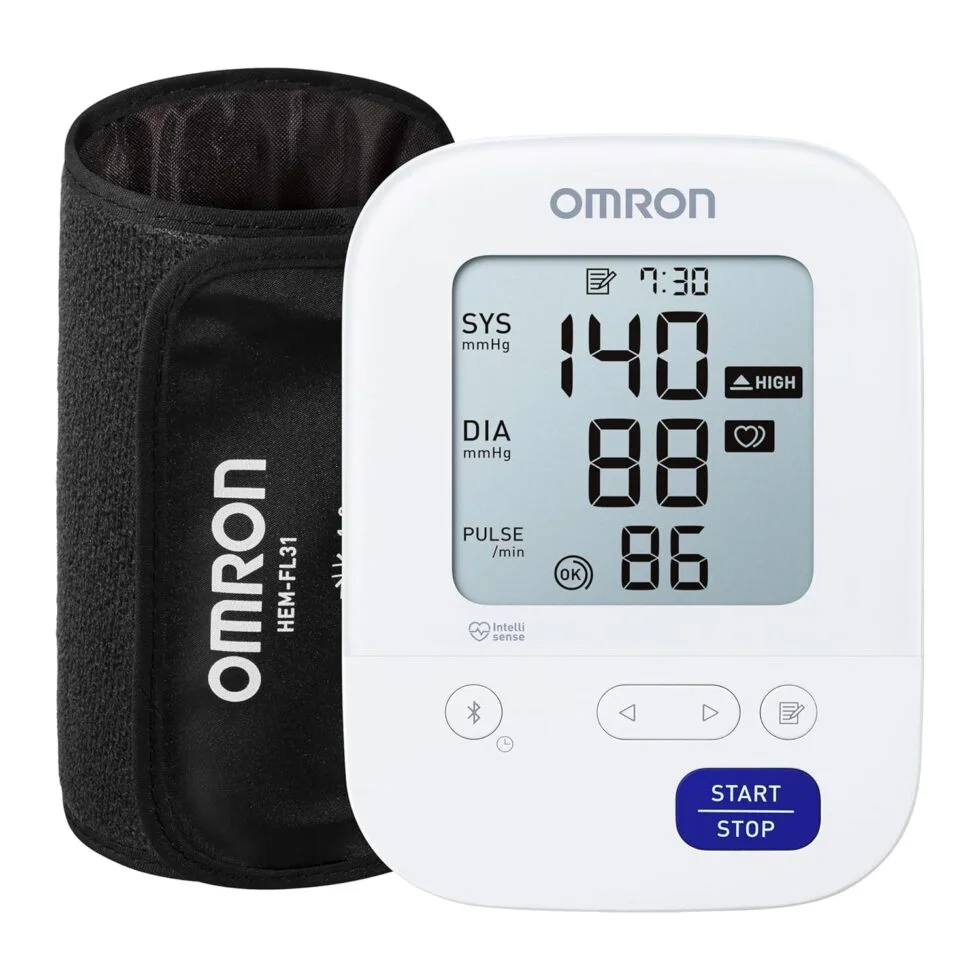
The HEM-7156T is an upper-arm automatic blood pressure monitor by Omron, designed for home use. It has features like Bluetooth connectivity, averaging of readings, memory storage, cuff fit indicators, etc.
Specifications :
Here are its technical details, as per available sources:
Pros
Here are the strong points of the HEM-7156:
- Better cuff design (IntelliWrap / 360° accuracy)
The cuff reduces errors due to incorrect wrapping. Easier for users who may not perfectly align the cuff. Helps improve consistency of readings. - More generous cuff range
22-42 cm covers a wider range of arm sizes (including somewhat thicker arms) compared to many standard cuffs. Helps if the standard cuff size is tight or uncomfortable. - Large memory + average readings
Being able to store 60 past readings with date/time helps track trends. Also, averaging multiple recent readings improves reliability (reduces fluctuations). - Multiple useful indicators
Detection of irregular heartbeat, body movement, hypertension indicator, and cuff wrap guide—all contribute to better quality control and more reliable readings. - Power flexibility
Using either batteries or an AC adapter supports continuous use without worrying about battery drain. Useful for more frequent monitoring. - Validated for pregnancy
For women monitoring blood pressure during pregnancy or risk of pre-eclampsia, having pregnancy validation is a big plus.
Cons
Here are things to watch out for, or drawbacks (depending on your needs):
- Size & bulk
Because of the robust cuff (22-42 cm) and internal components, the device is somewhat large and heavier (~780 g excluding batteries). It might be less portable or bulky to carry. - Cost / Price premium
All those extra features tend to push up the price vs simpler models. If you don’t need the memory or cuff wrapping guide, you might get a cheaper device that is “good enough.” - Accuracy still depends on the user’s technique
Even with better cuff/peripherals, things like posture, arm position, talking, movement, etc. still affect results. Indicators help, but don’t prevent all errors. - No clear mention of Bluetooth / App Sync in some markets
Although there is “Have Connectivity” in some descriptions, in the manual and official data I saw, there’s no universally guaranteed wireless data transfer or mobile app integration. If that is important (to log readings in your phone), this could be a limitation. (Double-check your specific region’s version.) - Battery costs/adapter cost
Using 4 “AA” batteries means recurring cost; the adapter adds cost. Also, for frequent daily use, battery replacement is something to keep doing. - The complexity of features may not be needed by all
For someone who simply wants to check BP occasionally, many of the advanced features (memory, cuff wrapping guide, etc.) may be overkill.
4. Dr. Morepen Blood Pressure Monitor Model BP-02
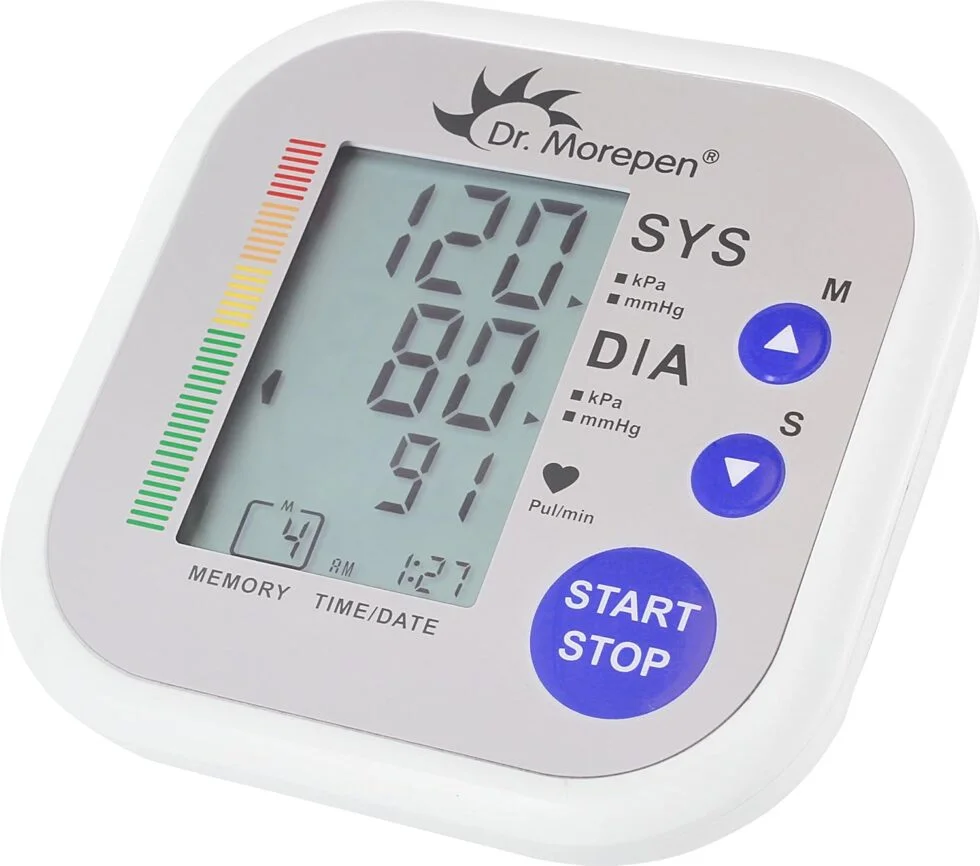
The Dr. Morepen BP-02 is a fully automatic upper-arm digital blood pressure monitor designed for home use. It uses the oscillometric method (automatic inflation + sensor) to measure systolic & diastolic blood pressure and pulse rate. Key features aimed at convenience are: comfort (gentle) inflation, memory storage, averaging of recent readings, an indicator for hypertension risk, and detection of irregular heartbeat. It is powered by batteries, has an LCD display, and includes everything needed (cuff, batteries, manual) for use out of the box. The device comes with a 1-year warranty.
Specifications
Here are its technical details, as per available sources:
Pros
- Good feature set — Memory function, averaging, hypertension/heart irregularity detection adds usefulness beyond basic readings.
- Comfort inflation — Inflates in a manner that should reduce discomfort, which is helpful, especially if one needs frequent measurements.
- Wide ranges — Covers a broad BP and pulse range. That means suitable for both low and high values.
- Two-user memory & many records — Useful if two people share the device; also helps track trends over time.
- Battery powered, portable — No need for a plug; can be used anywhere with batteries.
- Good warranty & support (brand in India) — Dr. Morepen is a local brand, with customer support available.
Cons
- Accuracy concerns with wrist/upper-arm devices in general — As with all non-clinical/home monitors, occasional calibration drift or variability is possible. One must follow the proper method (arm position, rest, etc.) to get reliable readings.
- Battery cost/replacement — Using 4 AAA batteries means recurring cost and also the need to keep spares, especially if used often.
- Size & bulk — The cuff size is fine, but the device is ~430 g, not super lightweight if frequent travel is needed.
- Display clarity — LCD is okay, but may lack ultra-high contrast or very large digits if vision is poor. (Depends on model; some others have “large display” versions.)
- No AC adapter mentioned (for this exact model in all listings) — So relying on batteries only may be less convenient for continuous use.
- Return / after-sales service constraints — As with many devices, these depend on retailer and location; warranty may not cover misuse/misreading; if spare parts like the cuff fail, replacement may cost.
5.A&D Medical Blood Pressure Monitors
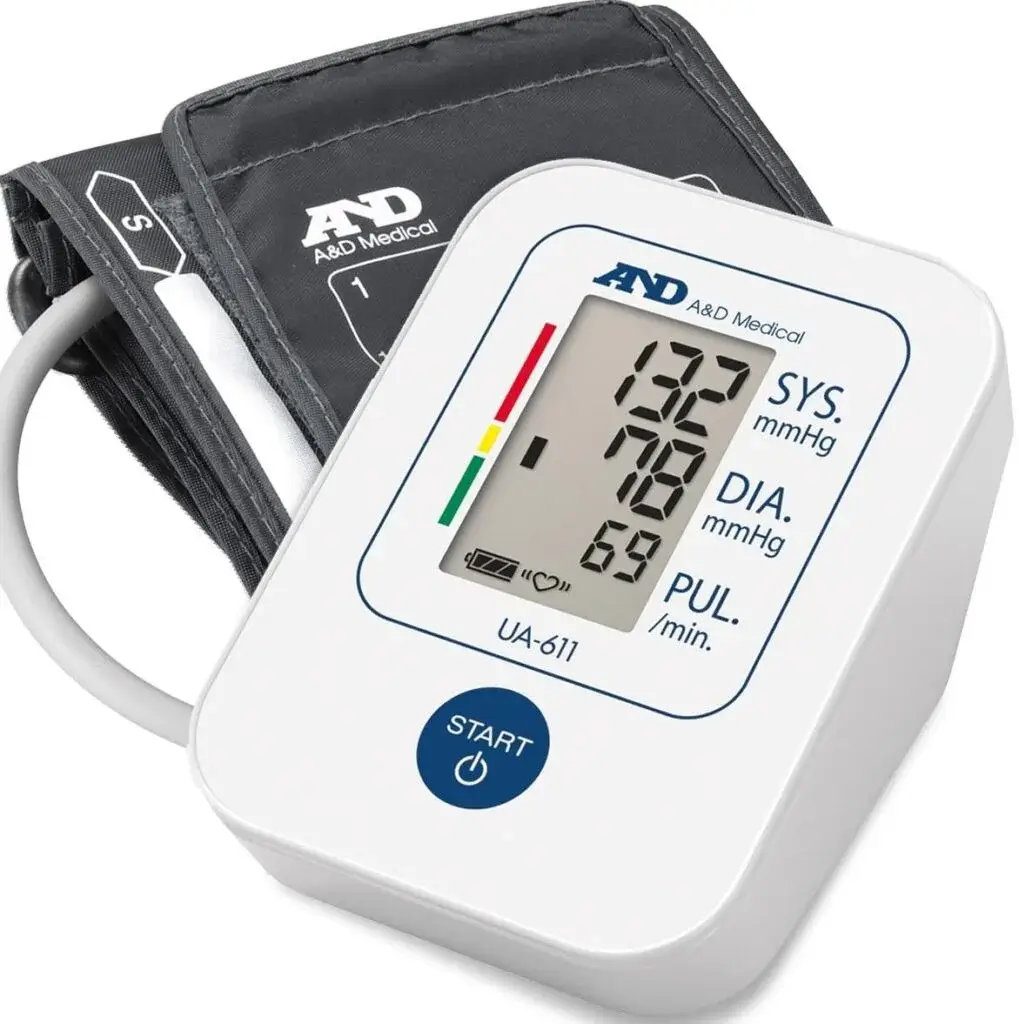
This is a blood pressure monitor you put on your upper arm. Omron made it, and its model name is HEM-7156T. It can tell you two numbers: the top number (systolic) and the bottom number (diastolic) to see how healthy your heart is. It also has a cuff that wraps around your arm, has Bluetooth so you can connect it to a phone app, and remembers past readings. It helps you see if your blood pressure is high or okay.
Specifications :
| Feature | Details |
|---|---|
| Cuff size | Fits arms that are about 22 to 42 cm around the arm. |
| Memory | Can store up to 60 readings with date & time. |
| Average reading | It can take 2-3 readings close together and give you an average, so it’s more accurate. |
| Battery | It uses 4 AA batteries to work. |
| Detects bad stuff | It can tell if you moved during measurement (which messes with accuracy), if your heartbeat is irregular, or if you didn’t wrap the cuff right. |
| Display | It shows numbers for systolic, diastolic, pulse, and has icons for errors, cuff fit, etc. |
| Bluetooth | Yes — it connects to Omron’s app so you can save the readings on your phone. |
Pros
- The cuff wraps well around the arm (22-42 cm), so lots of people can use it.
- It has memory to store 60 readings, so you can see your history.
- It gives you averages and warns you if your heart is a bit irregular or if you have moved, so readings are more reliable.
- Bluetooth is cool because you don’t need to write everything down — the phone does it.
- Good for home use; you can check yourself easily.
Cons
- Needs 4 AA batteries — you’ll have to replace them sometimes.
- It’s bigger and less portable than wrist monitors (heavier, bulkier).
- If you don’t sit still, or don’t have your arm at heart level, numbers may be wrong.
- Bluetooth + phone app might be tricky if you’re not used to apps.
- It might cost more because of all the features.
FaQs
1. What is an automatic blood pressure monitor?
An automatic blood pressure monitor is a medical device that uses electronic sensors and an inflatable cuff to measure your blood pressure. Unlike manual monitors, it automatically inflates, deflates, and gives digital readings without requiring a stethoscope or medical training
2. Are automatic blood pressure monitors accurate?
Yes, most modern automatic monitors are highly accurate when used correctly. However, accuracy can vary based on cuff size, arm position, and user movement. For best results, choose a clinically validated device and follow instructions carefully.
3. Which type of cuff is better: arm or wrist?
Upper arm monitors are generally considered more accurate and are recommended by doctors. Wrist monitors can be convenient but are more sensitive to positioning errors. If you use a wrist model, ensure your wrist is at heart level during measurement
4. What’s the ideal position for measurement?
Sit upright with your back supported, feet flat on the floor, and arm resting at heart level. Relax for 5 minutes before taking a reading for the most accurate results.
5. How often should I check my blood pressure?
If your doctor has asked you to track your blood pressure, measure it at the same time each day—typically morning and evening. For routine monitoring, 2–3 times per week is usually enough, unless otherwise advised by your healthcare provider.

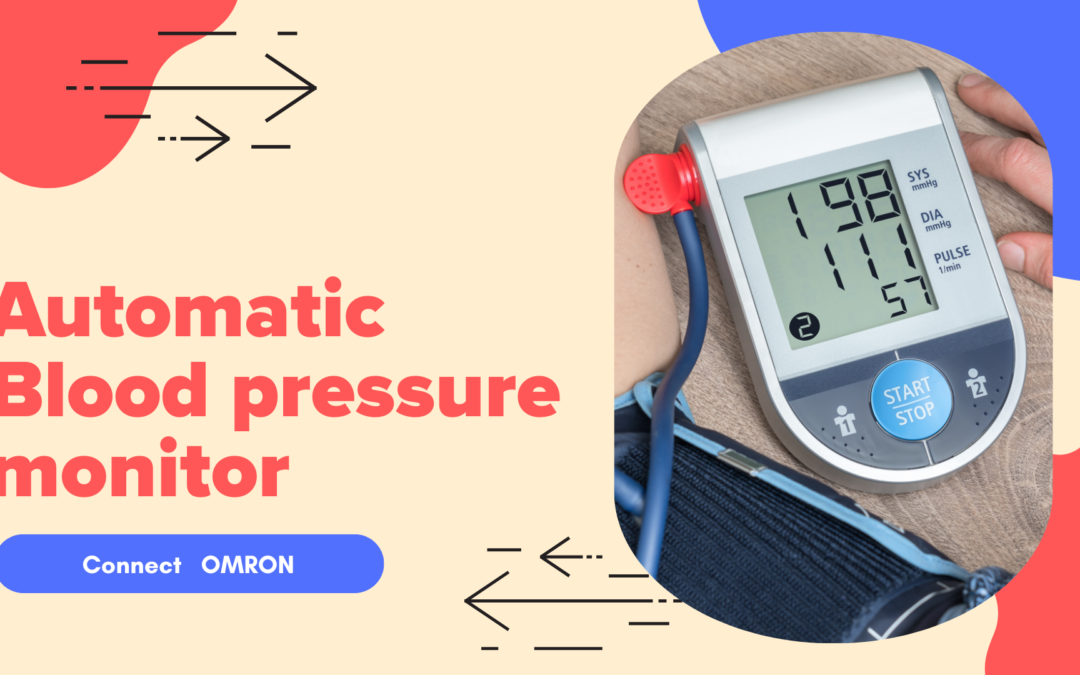
Leave a Reply